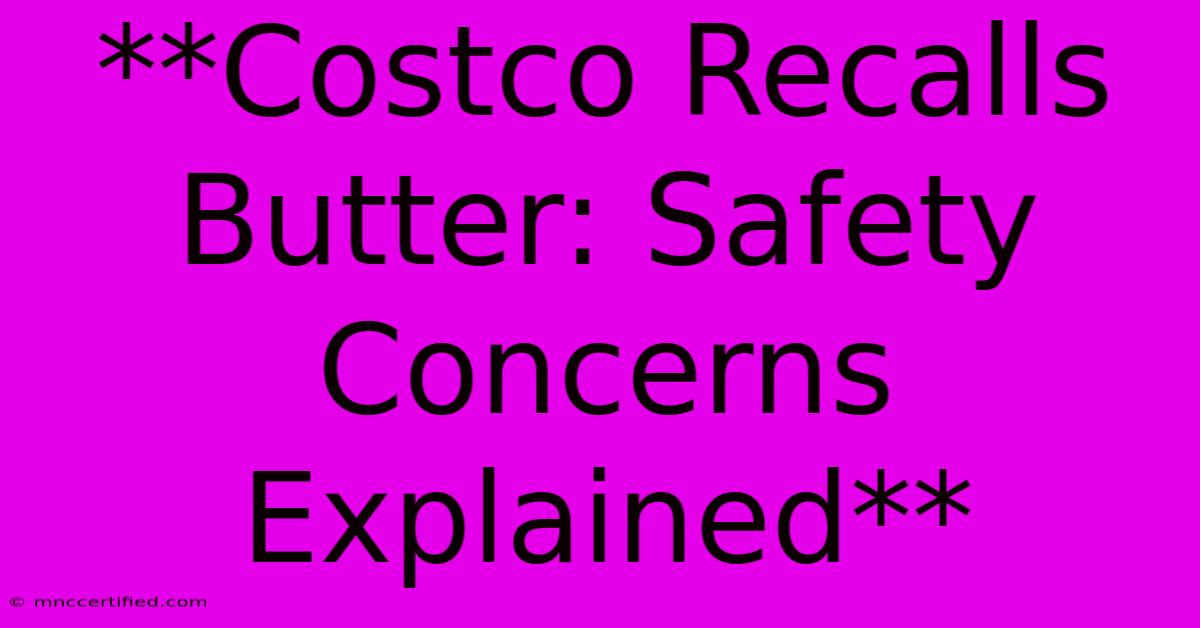**Costco Recalls Butter: Safety Concerns Explained**

Table of Contents
Costco Recalls Butter: Safety Concerns Explained
Costco, the beloved warehouse club known for its bulk buys and value prices, recently issued a recall for certain batches of butter. This recall, while concerning, is a crucial safety measure designed to protect consumers. This article will delve into the reasons behind the recall, what products are affected, and what consumers should do if they have purchased the recalled butter.
Why Was the Butter Recalled?
The recall was issued due to potential contamination with Listeria monocytogenes, a bacterium that can cause serious illness, especially in pregnant women, newborns, older adults, and people with weakened immune systems.
Listeria infection, also known as listeriosis, can lead to:
- Flu-like symptoms: fever, muscle aches, and fatigue
- More severe complications: meningitis, miscarriage, stillbirth, and even death
Which Butter Products Are Recalled?
The recall affects specific batches of Kirkland Signature Organic Salted Butter, which is sold exclusively at Costco stores. The affected products can be identified by their "Best By" dates, which are printed on the packaging.
To determine if your butter is affected, check the "Best By" date. The recalled batches have "Best By" dates ranging from:
- October 16, 2023, to November 1, 2023
If your butter falls within this date range, it is recommended that you do not consume it.
What Should Consumers Do?
If you have purchased Kirkland Signature Organic Salted Butter with a "Best By" date falling within the recall range, do not eat it. Instead:
- Return the butter to any Costco location for a full refund. No receipt is necessary.
- Dispose of the butter properly. Do not throw it in the trash. Instead, wrap it securely and place it in the freezer to prevent any potential contamination of other food items.
Staying Safe During Food Recalls
This recall highlights the importance of staying informed about food safety issues. Here are some helpful tips:
- Check for product recalls: Regularly check the website of the Food and Drug Administration (FDA) and the United States Department of Agriculture (USDA) for updates on food recalls.
- Read product labels carefully: Pay attention to "Best By" dates and other important information on food packaging.
- Store food properly: Always store perishable foods, like butter, at the correct temperature to prevent bacterial growth.
- Wash hands thoroughly: Wash your hands frequently, especially before and after handling food, to minimize the risk of contamination.
In conclusion, food recalls are a necessary precaution to safeguard public health. By remaining vigilant and adhering to safety guidelines, we can protect ourselves and our families from potential foodborne illnesses.

Thank you for visiting our website wich cover about **Costco Recalls Butter: Safety Concerns Explained** . We hope the information provided has been useful to you. Feel free to contact us if you have any questions or need further assistance. See you next time and dont miss to bookmark.
Featured Posts
-
Chiropractic Care Without Insurance
Nov 13, 2024
-
Insurance Agencies For Sale Near Me
Nov 13, 2024
-
Martin Lewis Car Check For 2007 2021 Owners
Nov 13, 2024
-
Download 2025 Lineup Green Day Korn Sleep Token
Nov 13, 2024
-
South Carolina Motorcycle Insurance
Nov 13, 2024